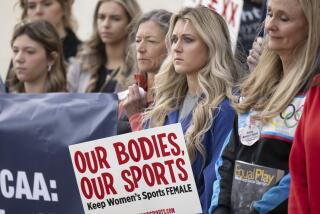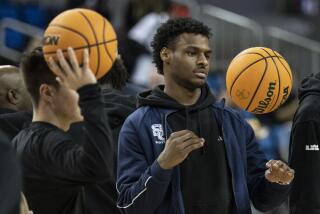Gathers’ Family Plans to File Suit : Lawsuit: Attorney claims a Loyola official requested reduction in player’s medication.
- Share via
On the day that Dobbins Tech High School in Philadelphia held a memorial service for Hank Gathers, an attorney for Gathers’ family announced Friday he plans to file a lawsuit in L.A. Superior Court against those he believes are responsible for the former basketball star’s death.
Gathers, 23, collapsed last Sunday during a West Coast Conference tournament game in Gersten Pavilion. The Loyola Marymount star died 1 hour 40 minutes later at Daniel Freeman Marina Hospital.
For the record:
12:00 a.m. March 11, 1990 For the Record
Los Angeles Times Sunday March 11, 1990 Home Edition Sports Part C Page 7 Column 1 Sports Desk 1 inches; 30 words Type of Material: Correction
Gathers--In the story that appeared in Saturday’s editions, it was stated that a defibrillator was not used on Hank Gathers. The defibrillator was not used on the court, but was used once Gathers was outside the gym.
Among the most serious claims made by Bruce Fagel, a Beverly Hills attorney who was previously a physician specializing in emergency medicine, was that someone in the Loyola athletic department requested a reduction in Gathers’ medication. Fagel said that request, obtained in medical records, came “because it was affecting his play.”
Fagel said his staff is trying to determine who was involved in allowing Gathers to play and whether proper medical standards were followed after Gathers collapsed at midcourt. After that, the defendants will be named, he said.
“Clearly the university wanted Mr. Gathers to play and they were involved,” Fagel said. “I’m not sure if it was the coach or trainer. It is obvious at this time the university is as much or more involved than the physicians in the circumstances that led to Gathers’ death. I want to find out who at the university intervened in making decisions pertaining to medication dosages as well as the decision to play.”
In a statement issued by the university Friday night, Martin Burke, Loyola’s legal counsel, said the university was cooperating with Fagel’s investigation.
“Loyola Marymount University has made available to Bruce Fagel . . . medical records from the university health center,” he said in the statement. “It is our understanding that the physicians have cooperated with Mr. Fagel, and it is the intent of the university to fully cooperate in the investigation.
“The threat of a lawsuit requires, however, that we consult with our insurance carriers and their legal counsel. We will do this on Monday. The university is convinced that Hank Gathers had outstanding physicians and that the administration acted responsibly. He was only allowed to resume his athletic activities following written release by his physicians.”
Brian Quinn, Loyola Marymount’s athletic director, said he had been advised by Burke not to comment on the allegations made by Fagel.
Quinn acknowledged, however, that he was bothered by the fact that Fagel held the news conference to make the charges before Gathers’ funeral.
“I would say to you and anyone else that there was a beautiful marriage between Hank and our university,” he said Friday night. “I hate to see anything at this point take away from the man, the grieving and hurt on our campus, the grieving of his family. I’m going to the funeral to pay my last respects. After that, I will have to sit down and figure out what’s going on and why. At this stage, I believe we did everything right and followed the best medical advice. I don’t know what else I can say.”
Although Gathers’ funeral is not scheduled until Monday in Philadelphia, Fagel said he was compelled to announce the $1-million-plus suit after Loyola president James N. Loughran said he was satisfied with the school’s handling of the matter.
Loughran told The Times on Thursday that a doctor’s letter allowing Gathers to play relieved the university of any responsibility.
The suit could encompass personal physicians, attending physicians and the school. Fagel said the case will involve allegations of medical malpractice and infliction of emotional distress on family members who witnessed the incident Sunday.
California state law limits damage to $250,000 for malpractice claims of pain and suffering against doctors.
Gathers fainted Dec. 9 during a game against UC Santa Barbara, and underwent a number of tests that revealed he suffered from a heart condition.
He was prescribed the drug Inderal, a beta-blocker that can helps control abnormal heart rhythms. Fagel said medical records show that Gathers reduced his medication three times--from 240 milligrams to 40 milligrams--at the recommendation of Dr. Vernon T. Hattori, a cardiologist affiliated with Daniel Freeman Memorial Hospital in Inglewood.
Fagel also said family members and friends told him that Gathers took his medication Saturday and Sunday.
Side effects of Inderal, according to the Physicians’ Desk Reference, include weakness, fatigue and lethargy with dosages of at least 160 milligrams per day.
Fagel said Gathers’ medical records were made available by the doctors who treated the player--Hattori and Dr. Michael Mellman. While Fagel has received some records from the university, he said school officials refused to release other records on Gathers such as the doctor’s clearance to allow Gathers to play.
He said the Los Angeles County Coroner’s office said preliminary tests show Gathers’ heart problem caused his death. The coroner’s report is expected to be released Wednesday or Thursday.
The suit also is expected to question the procedures of Gathers’ immediate care Sunday. Loyola officials had purchased a defibrillator on Hattori’s advice when Gathers returned to the Lions’ lineup Dec. 30. It was taken on the road when Loyola played in Philadelphia against LaSalle and St. John’s.
The instrument, which can shock a failing heart back to a normal rhythm, was not used after Gathers collapsed. Dr. Benjamin Schaeffer, an orthopedist from the Kerlan-Jobe Clinic, and Dr. Daniel Hyslop, from Loyola’s Student Health Services, attended him.
More to Read
Get our high school sports newsletter
Prep Rally is devoted to the SoCal high school sports experience, bringing you scores, stories and a behind-the-scenes look at what makes prep sports so popular.
You may occasionally receive promotional content from the Los Angeles Times.






